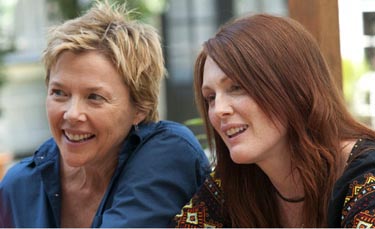Written with a crystalline ear for everyday miasmas, Lisa Cholodenko and Stuart  Blumberg dive deftly into the depths of contemporary family ties. The Kids are All Right stars Annette Bening and Julianne Moore as a longtime lesbian couple whose teenaged children are busy testing boundaries. As their 18-year-old daughter Joni, played to restless perfection by Mia (Alice in Wonderland) Wasikowska, gets ready to go off to college, the younger son, Laser (Josh Hutcherson) goads her into contacting their sperm donor father (Mark Ruffalo). Set in the hip enclaves of bourgeois Southern California, the film offers us the new American family—green, eco-conscious, bristling with political correctitude—on the verge of more revelation than it can handle.
Blumberg dive deftly into the depths of contemporary family ties. The Kids are All Right stars Annette Bening and Julianne Moore as a longtime lesbian couple whose teenaged children are busy testing boundaries. As their 18-year-old daughter Joni, played to restless perfection by Mia (Alice in Wonderland) Wasikowska, gets ready to go off to college, the younger son, Laser (Josh Hutcherson) goads her into contacting their sperm donor father (Mark Ruffalo). Set in the hip enclaves of bourgeois Southern California, the film offers us the new American family—green, eco-conscious, bristling with political correctitude—on the verge of more revelation than it can handle.
Director Cholodenko and her co-writer achieve the exact angle of post-hippie rhetoric as Moore begins planning yet another casual career, this time as a landscape gardener, against the controlling wishes of her partner Nic, a physician and the family bread winner. Bening is at her best in this film, inhabiting her role with complete physical authority and edgy intelligence.
“No phone calls at the table,†Nic scolds her son, who currently hangs out with a drug-taking bully. Bening’s Nic is a study in brittle tension, handling her fears about aging and loss of intimacy with plenty of red wine therapy and bitchy ripostes. As restaurateur and organic gardener Paul, Ruffalo uses his luscious laid-back appeal to good effect. When he meets Joni and Laser, all three fall for each other—Paul sees in them the children he might have raised, and they see the father, well, you get the idea. A “no worries” bachelor who happily exercises his sexual urges, Paul finds himself in unexpected territory when he comes to dinner to meet the women. “I love lesbians,†he enthuses, while shocking Nic with the revelation that he dropped out of college.
As the children start spending more time with Paul, Nic becomes increasingly threatened. It gets worse when Jules accepts Paul’s offer to landscape his back yard only to end up in some of the funniest sexual situations since vintage Woody Allen. Fast forward Annie Hall to the summer of 2010 and you see the possibilities.
Abandoning her feminine glamor for designer butch and Patagonia, Bening climbs into this role as the tightly-wound mater familias and disappears into a gorgeously sculpted raft of edges, pursed lips and clenched fists. Brilliantly understated, she creates a rich and complex character who soars beyond lesbian husband cliché. She is the head of a family headed toward the sorts of cyclical breakdowns that have afflicted families since Sophocles. In hers, and in all of these outstanding performances, the filmmakers probe further than simply creating a lively argument for gay marriage. The Kids are All Right portrays the pain and glory of all families who try to honor the individual while maintaining the whole.
The script is spot on. “I don’t think that higher learning, in general, blows,†Ruffalo explains without a trace of self-conscious irony, to the shock of the two women, and his daughter who is about to enter college.
Moore is wonderful as the tentative, possibly ditsy Jules, attempting to find traction with some career or other. ‘You could go Asiany,†suggests Jules, as she outlines plans for Paul’s garden. The psycho-economics of sperm donorship are on full display here, and we watch helplessly as Pandora’s box scatters its seed of unforeseen consequences.
Ruffalo is a terrific foil for the determined female couple, all earthy, uncluttered wisdom and testerone charm. He’s real and uncomplicated, as irresistible as Nic and Jules are shrill and habit-bound. Naturally the kids are attracted to him.
Ultimately several key plot twists threaten every single member of this bracingly modern extended family. Comedy once again proves the best route to the hard truths of human existence. The ending, led by Bening, is perhaps more sobering than even the director intended. Undone by events out of her control, Bening’s Nic somehow finds the fierce resolve to win her family. And in the end the father-who-might-have-been is left with his nose pressed to the window, looking in at all the years of being there, being close, paying dues, that he didn’t share. His loss is the tragic underbelly of this laugh-out-loud funny dissection, a dissection of a family we all know too well. It is ours.
– at the Nick, starting Friday.

